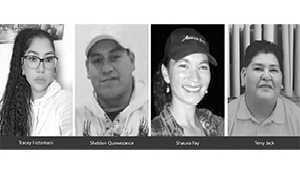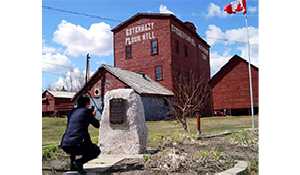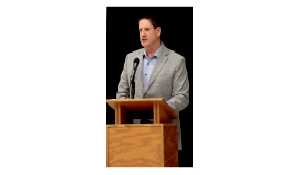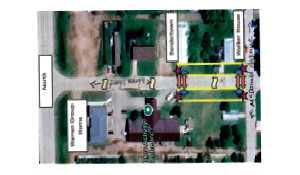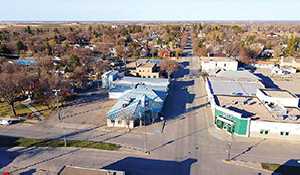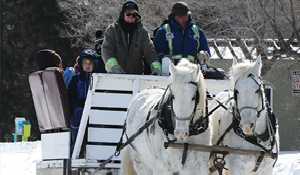Esterhazy holding Hazy Days this weekend
June 16, 2025, 12:28 pm
Ryan Kiedrowski, Local Journalism Initiative Reporter

Esterhazy is going to be a busy place this weekend as the annual Hazy Days celebration takes place. The event kicks off Friday with the Esterhazy Community Market running for longer hours.
“For anyone who attends regularly, that’s a good opportunity if they want to stay later,” says Hayley Nixon, one of the organizers with Hazy Days. “Usually, they have to end at a certain time, but they got their insurance extended.”
Peak activity for Friday night will be at the Esterhazy High School football field with the Warrior Football Club Alumni game kicking off at 7 p.m.
“This alumni football game is actually quite a big deal,” Nixon said, noting that her brother, Colton, is one of the coaches. “He’s organizing that, so I must have inspired him a little bit to take that on. He was an alumni football player, though, as well, so I’ll give him that. But they’re doing a good job with organizing all that. They’re having a ‘kick to win’ and that will be sponsored by local businesses. A lot of things are pieced together by the local businesses, which is nice.”
Along with the football game is a tailgate party at the outdoor rink from 5 p.m. to 1 a.m. featuring live music.
“People can come and watch the game and have a beverage, and we might have some lawn games there just to keep it active,” Nixon said. “That will be something, hopefully, to appeal to the younger crowd.”
Saturday will be full of things to do, starting off with the Esterhazy Community Daycare pancake breakfast at the SN Boreen Hall at 8 a.m.
At 9 a.m., the Hazy Trail Race begins, which is a 5 km or 10 km walk/run at the Esterhazy walking trails.
“There are 25 registrants for that already, so that hopefully will be a good turnout for the first one,” Nixon said.
One of the main events of the weekend is the annual Hazy Dayz Slo-Pitch Tournament —something Nixon has been running for the past three years and draws teams from near and far.
“We’ve got eight teams already for that, so that’s all locked in,” she said. “We’ve got the concession open there and beer gardens, and there will be a few other vendors in that area. Pretty much everything we’re doing Saturday will all be in that regional park, ball diamonds area.”
The same location will be the site of the Kids’ Zone, which runs from noon to 4 p.m.
“There’s one ball diamond that we’re not using, which will used for a Hazy Days’ Kid Zone,” Nixon explained. “So we’re going to be setting up a few bouncers and mini golf and other interactive games there.”
Another new addition this year will be the outdoor yoga at the EHS football field, hosted by the Esterhazy Yoga Collective.
“We’ve got outdoor yoga happening, which will be a nice option for those who aren’t playing slo pitch or maybe all the football players who need to do a stretch.
“It does happen to be the Summer Solstice, and if it’s a nice day, it would be a cool thing to do the outdoor yoga. I enjoy yoga, so I thought it would be a nice touch, even though I won’t be able to attend it. Unless I lose my ball tournament early, then I suppose.”
Those taking part in the outdoor yoga are encouraged to bring their own mats and water bottles.
Another way to beat the afternoon heat will be a double feature over at the Maple Leaf Theatre.
“They offered to do two free movies in the day,” Nixon said. The Sandlot will be playing at 2 p.m. and A League of Their Own will be playing at 4 p.m. “They wanted to keep with the baseball theme, so that will be another good thing for all those tired kids who have been active all day.”
Capping off the celebrations on Saturday will be the Kelly Brothers, who hit the stage at the Esterhazy Golf Course Clubhouse at 8 p.m.
“Another one that I’m excited about is at the end of the day,” Nixon said. “We’ll have the Kelly Brothers band playing, and they’re local out of Rocanville.”
The golf course will also be offering specials all day June 21.
“The golf course has offered discount golf all day, and food and drink specials all day, so everybody is chipping in,” Nixon said. “When we’re planning everything, I want to make sure there’s something for everyone. The first couple of years, a person can only do so much, and I was geared around the slow pitch, but all these other things I enjoy all the same, and I hope someone else enjoys them all the same. I want there to be something for everyone, because we do have such a diverse community.”
Organizers would like to keep the event on the same weekend every year, setting aside the third weekend in June for Hazy Days.
“I’m one of those people who like the consistency as well,” Nixon said. “The more we go on, and the more events become more locked in, then everything becomes consistent. People know what to expect, they know what they want to attend. It all lines up nicely and then we have room to add.”
One big theme of the entire event is enjoying the town spirit and enthusiasm, with everyone welcome to participate.
“Any businesses or organizations that want to participate, whether it be a sponsor or a vendor or volunteer, whatever it might be, that is what we’re trying to do,” Nixon said.
A good example of local businesses joining in the fun is the third annual Patio Party hosted by Luxx Medi Spa and Prairie Girl the Label on June 19 from 5-9 pm. They will be offering tacos and tequila at 410 Main Street, featuring carne asada tacos from Maid Marien’s Catering.
“Yes, we organize Hazy Days, but what we want to do is provide an opportunity for all these different organizations or user groups to come together and do their own thing,” she concluded. “It’s all in one location so that people can see what Esterhazy has to offer.”




